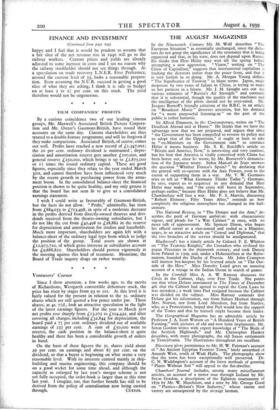THE AUGUST MAGAZINES
INT the Nineteenth Century Mr. M. Wolf describei "The European Situation " as essentially unchanged, since the dicta- tors do not grasp the significance of the resistance that is being organised and that, in his view, does not depend upon Russia. He thinks that Herr Hitler may wait till the spring before attempting a new aggression. " Viator," writing on "The Crisis of Capitalism," suggests that international capitalism is backing the dictators rather than the peace front, and that it is very foolish in so doing. Mr. A. Morgan Young defines " The Significance of Tientsin " in blunt terms. Japan, made desperate by two years of failure in China, is trying to make us her partners in a felony. Mr. J. M. Spaight sets out the various estimates of "Russia's Air Strength" and contends that it is substantial, though the quality of the machines and the intelligence of the pilots should not be over-rated. Mr. Jacques Bomoff's friendly criticism of the B.B.C. in an article on " Broadcast Music " deserves attention, but his demand for " a more purposeful listening-in " on the part of the public is rather fantastic.
Sir Alfred Zimmern, in the Contemporary, writes on "The Deadlock Abroad and at Home." He thinks that we have the advantage now that we are prepared, and argues that since " the Government has been compelled to reverse its policy and to adopt that of the Opposition," it ought at least to take in " ex-Ministers on the Government side " to convince Hitler it means business. Mr. S. K. Ratcliffe's article on " Britain and America, Now," is interesting and very cautious, but his hint that America is vitally concerned with China has been borne out, since he wrote, by Mr. Roosevelt's denuncia- tion of the Japanese treaty. Senor Manuel de Irujo answers the question " Whither Franco's Spain? " by declaring that the general will co-operate with the Axis Powers, even to the extent of supporting them in a war. Mr. V. W. Germains tries to tell us " What Germany Thinks Today "; Germans, he says, expect us to acquiesce in any demand that Herr Hitler may make, and " the crisis will burst in September, perhaps earlier," because Herr Hitler does not believe that Mr. Chamberlain will face a war. Mr. F. S. Marvin, discussing " Robert Elsmere: Fifty Years After," reminds us how completely the religious atmosphere has changed in the half- century.
The National Review, in " The Danger and the Aim," de- scribes the peril of German ambition: with characteristic vigour, and pleads for " a War Cabinet " at once, with no more talk of appeasement. Mr. Spencer Dixon, who began his official career as a vice-consul and ended as a Minister, urges, in an attractive article on " Consul and Diplomat," that the two branches of the service should be amalgamated.
Blackwood's has a timely article by Colonel F. E. Whitton on " The Teutonic Knights," the Crusaders who civilised the pagan Prussians in the thirteenth century, and took Danzig from Poland in 1309, and, under a Hohenzollern at the Refor- mation, founded the Duchy of Prussia. Mr. John Crampton will interest bee-keepers by his learned article on " The Out- side of the Hive." Miss Dorothy Laird gives an amusing account of a voyage in the Indian Ocean in search of guano.
In the Cornhill Miss A. A. W. Ramsay discusses the Crisis in the Cabinet, 1845, over Free Trade. She points out that when Delane announced in The Times of December 4th that the Cabinet had agreed to repeal the Corn Laws he was mistaken ; a week later Peel resigned because the Cabinet was divided on the subject. Miss Ramsay contends that Delane got his information, not from Sidney Herbert through Mrs. Norton, nor from Lord Aberdeen, but from Stanley, who, as a Protectionist, hoped that Peel would lose the support of the Tories and that he himself might become their leader.
The Geographical Magazine has an admirable article by Professor J. A. Scott Watson on " A Hundred Years of British Farming," with pictures of old and new farm implements. Mr. Seton Gordon writes with expert knowledge of " The Birds of the Scottish Highlands," and Mr. Christopher Hankey describes, with many photographs, the old Saxon settlements in Transylvania. The illustrations throughout are excellent.
Discovery gives prominence to Mr. H. W. Fairman's account of " An Ancient Egyptian Frontier Town," lately unearthed at Amarah West, south of Wadi Haifa. The photographs show that the town has been exceptionally well preserved. Dr. C. N. Waddington's account of the latest methods of growing " Plants Without Soil " will appeal to the flat-dweller.
Chambers' journal includes, among many miscellaneous articles, an account of a motor tour through Iceland by Mr. Seton Gordon, a description of the Eglinton tournament of 1839 by Mr. W. Hutchison, and a note by Mr. George Good on " Plastics—Britain's New Industry," whose extent and variety are unsuspected by the average layman.








































 Previous page
Previous page